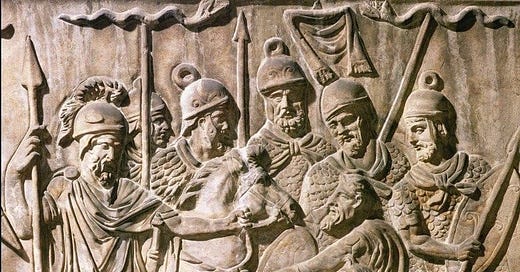If you are looking for the beginning of the study of Tacitus’ Germania then you can go HERE for a brief introduction. At the bottom of the introduction you will find the links to each section of the study guide as it becomes available. If you would like to see the growing list of available book studies available for free on this site you can go HERE. Enjoy!
Virtues/Vices/Great Ideas: (Find them in the Text)
Recklessness, Indulgence, Despotism, Fortune, Gullibility, Justice, Freedom, Friendship
Grammar Questions: (The Information of the Text)
What kind of entertainment did the Germani enjoy?
What was the Germani’s practice concerning funerals and mourning the dead?
What favored status did the Batavi enjoy in relation to Rome?
What did the “bravest” of the Chatti wear for a time and when could they take it off?
What were the Tencteri people most known for?
What did Tacitus say it is “more reverent to believe…than to investigate?”
According to Tacitus, why were the Chauci “one of the noblest people of Germania?”
What had the Romans learned about “the freedom of the Germani?”
What “savage ritual” were the Semnones (one of the Suebi people) known for?
What did the Germani who worshipped “Nerthus” believe about that goddess?
What disturbing, but effective, battle tactics did the Harii employ?
What is notably different about the way the Suiones rule their people?
What did the Aestii collect and sell to the Romans, though they cared nothing for it themselves?
How did Tacitus describe the Fenni people?
Logic Questions: (Interpreting, Comparing/Contrasting, Reasoning)
Why might Tacitus have called Divus Julius “the greatest of authorities” on the matter of the Gauls?
Of the Chatti people, Tacitus said “They regard fortune as uncertain, valour as certain.” What did he mean by that?
Why would the bravest of the Chatti “wear an iron ring” around their neck when they counted that as a “disgrace?”
Why would the Tencteri not automatically hand their horses down to the eldest son of the family?
What did Tacitus mean by saying “Fortune now has no better gift than the discord of our foes?”
What did Tacitus mean by saying that the Chauci’s “superiority does not rest on aggression?”
What did Tacitus mean when he said “When the strong hand decides, restraint and integrity are words that belong to the victor?”
What is the purpose in drowning the slaves in the lake after they finished their service to Nerthus?
What did Tacitus mean by saying “Defeat in battle always begins with the eyes?”
Tacitus said, concerning the Suiones, that “it is not in the king’s interest to assign control of arms to a noble or free man, or even a freedman.” Why was it important that the arms be kept under the care of a slave instead?
Rhetoric Questions: (The Analysis of Ideas in the Text)
Tacitus tells us that among the Germani, “The practice of usury and compound interest is unknown; ignorance here is a surer defence than a ban.” From this might we infer that certain kinds of wicked practices are only employed by those who are more educated? Conversely, does ignorance protect men from engaging in certain kinds of evil? Beyond the example of the practice of usury, can you think of another example of a kind of wicked practice that takes greater understanding in order to participate in it? If education opens us up to higher forms of wickedness, does this mean that it is better to remain ignorant? Why or why not?
Tacitus observed that “the freedom of Germania is a deadlier enemy than the despotism of Arsaces.” Do you think that a people who enjoy great freedom are harder to conquer than a people who are used to being in subjection and slavery? Why or why not?
Consider the Fenni people discussed in Chapter 46. Do you think these people are the most free a people can be? Why or why not?
Theological Analysis: (Sola Scriptura)
Read Deuteronomy 23:19-20. How does this address the issue of “usury” or charging interest for loans? Read Luke 6:27-36. How does this impact the discussion on charging interests on loans? What do you think, should Christians ever lend money and charge interest? Should Christians accept a loan where interest will be charged? If it is permissible to charge interest in at least some cases, when and to what degree? If not, why not?
Tacitus said that since Drusus Germanicus’ exploration, “no one has made the attempt” to find the pillars of Hercules “and it has been judged more pious and reverent to believe in what the gods have done than to investigate it.” Read 1 Corinthians 15:1-28 and compare and contrast the apostle Paul’s attitude about looking into religious claims, and its relationship to piety, with what Tacitus has said here. What should we conclude about the differences between Christianity and Tacitus’ perspective on piety?



